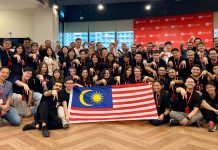Highlights:
- Third national car blueprint to be presented to PM in two weeks
- Alibaba sets new record through singles day sales
- Malaysia companies recorded total sales valued at USD 20,504,500 at CIIE, Shanghai
- FIM 2019 eyes RM400 million investments
- AirAsia’s GTR unveils Malaysia´s first digital airport control centre
- Singapore and China sign several agreements, including free trade agreement upgrade
Third national car blueprint to be presented to PM in two weeks
The blueprint to drive the third national car project will be presented to Prime Minister Tun Dr Mahathir Mohamad in two weeks and then submitted to the Cabinet for approval. Entrepreneur Development Minister Datuk Seri Mohd Redzuan Md Yusof said a deadline for submissions for the project’s vendor development programme would be established once the blueprint was completed. He added that more than 50 local vendors had submitted their applications to the ministry. “The third national car project will be what the market wants. Cars nowadays are like gadgets when looking at the technology. So, we are shaping the car based on our capability and on the environment that is provided by the world in terms of technology and application,” he told reporters at the Federation of Malaysian Manufacturers (FMM) SME Conference 2018 in Kuala Lumpur. Datuk Seri Mohd Redzuan said the establishment of the new car project would be among the main drivers to boost the manufacturing sector’s contribution to the economy. He said small and medium enterprises (SMEs) which formed the backbone of the economy were highly concentrated in the services sector, which accounted for 89.2 per cent of SMEs. “We need the manufacturing sector to spin off the services sector. Hence, there is a need to upgrade and graduate the micro and small players to become medium enterprises,” he said. Out of 907,065 SMEs in the country, 76.5 per cent are micro players, 21.2 per cent are small sized and the remaining 2.3 per cent are medium enterprises.
Speaking at the same event, FMM President Datuk Soh Thian Lai said there was a strong need for SMEs to re-engineer their operations by embracing Industry Revolution 4.0 technology. “There were three significant game-changing plans announced by the government, namely the 2019 Budget, the Mid-Term Review of the 11th Malaysia Plan and the launch of the National Policy on Industry 4.0. “We certainly need to digest these development plans closely. We hope to receive clearer directions and details through the implementation of various programmes and initiatives,” Soh said. He also emphasised on the need to support the manufacturing sector by ensuring a business-friendly operating and investment environment.
Alibaba sets new record through singles day sales
Alibaba Group set a new record for its Singles Day by posting sales of 213.5 billion renminbi (US$30.8 billion) in the 24-hour shopping event on Sunday. Gross merchandise value (GMV), a figure that shows sales across the Chinese e-commerce giant’s various shopping platforms, surpassed last year’s RMB168.2 billion (US$25.3 billion) sales on the day. Chief Executive Officer Daniel Zhang said this represented a 27 per cent growth from 2017. “Participation from the entire Alibaba ecosystem enabled our brand and merchant partners to engage with consumers like never before. Looking ahead, Alibaba will continue to lead the evolution towards the future digital economy and lifestyle,” he told a press conference here in conjunction with the online shopping event, also billed the Double 11 shopping gala (11.11) He also said the group would continue to innovate, according to people’s lifestyles, and which will change with the development of new technologies and business model. Zhang believed in the next five to 10 years, the 11.11 (event) of the year will be different and Alibaba would continue to innovate and embrace changes brought about by new technologies. The Singles Day recorded 69.3 billion renminbi (US$10 billion) in GMV through Alipay in just one hour and 48 seconds. It also set a new world record as 6.9 billion renminbi of total GMV was settled through Alipay in the first one minute and 25 seconds after kicking off at 12 am (Nov 11). The 11.11 also broke another record of 150 billion renminbi of total GMV in 12 hours, eight minutes 40 seconds, compared to last year (21 hour 12 minutes 35 seconds). During the 2018 festival, over 40 per cent of consumers made purchases from international brands and 237 brands exceeded 100 million renminbi in GMV, including Apple, Dyson, Kindle, Estée Lauder, L’Oréal, Nestlé, Gap, Nike and Adidas.
Malaysian companies recorded total sales valued at USD 20,504,500 at CIIE, Shanghai
Minister of International Trade and Industry, Datuk Darell Leiking led the Malaysian delegation to the first China International Import Expo (CIIE) in Shanghai and a working visit to Hangzhou and Yiwu 4 to 11 November 2018. China President Xi Jinping predicts import of high value goods and services would exceed USD 30 trillion and USD 10 trillion respectively in the next 15 years, from countries along the Belt and Road Initiative. President Xi also announced number of measures including lowered tariffs and ease market access to promote common growth and build open global economy. Malaysia welcomes such initiative as it will boost bilateral and regional trade and investment activities. Through the first participation in CIIE, Malaysian companies received a total of 1,267 trade enquiries. On the sales outcome, Malaysia companies recorded total sales valued at USD 20,504,500 (RM86,030,730.65) with immediate sales valued at USD11,500.00 (RM48,250.55) and potential sales valued at USD 20,493,000 (RM85,982,480.10). Datuk Darell also visited technology companies such as Huawei Shanghai Research and Development Centre (R&D) and Mobile Broadband (MBB) Shanghai.
FIM 2019 eyes RM400 million investments
The Malaysian Franchise Association (MFA) is targetting 12,000 visitors to the Franchise International Malaysia (FIM) 2019 event and franchise investments worth RM400 million. The three-day event will be held from April 5 next year at the Kuala Lumpur Convention Centre. Chairman Datuk Radzali Hassan said the target was based on the success of FIM 2018, which recorded a transaction value of RM370 million from over 100 local and international franchise brands. He said 30 per cent of the 140 booths provided at FIM 2019 had been taken up. Datuk Radzali added that foreign franchisees and franchisors, including from South Korea, Taiwan and Australia, will be taking part at FIM 2019, a platform for franchise industry players to promote, share ideas and knowledge, and expand their business network.
AirAsia’s GTR unveils Malaysia’s first digital airport control centre
AirAsia’s ground handling services company Ground Team Red Sdn Bhd (GTR) has unveiled its digital airport control centre at the Kuala Lumpur International Airport, the first of its kind in Malaysia. The fully digitalised control centre will allow GTR to track aircraft handling by converging real time digital information on passenger boarding, baggage reconciliation and ramp loading activities through a digital dashboard, with an aircraft turnaround target of 25 minutes. AirAsia Group Chief Executive Officer (CEO) Tan Sri Tony Fernandes said by digitalising the operations, guest services personnel would be able to use a smartphone to execute the gate boarding process, allowing the staff to board passengers conveniently, while tracking the gate boarding process in real time efficiently and accurately.
Singapore and China sign several agreements, including free trade agreement upgrade
China and Singapore have signed a slew of agreements, including the upgrade of a bilateral free trade pact, which will allow greater market access for Singapore companies. This comes as Chinese Premier Li Keqiang arrived in Singapore for a five-day visit today. The Chinese premier and Singapore Prime Minister Lee Hsien Loong witnessed the exchange of several agreements. The China-Singapore Free Trade Agreement grants Singapore businesses preferential treatment, which leads to lower tariffs, for exports of certain petrochemical products and greater access to China’s legal, maritime and construction services sectors. Investment protection, customs procedures and trade remedial measures will also be improved, while new areas of cooperation, including in e-commerce and the environment, will be forged. The countries’ leaders also witnessed the signing of the first Memorandum of Understanding on the Southern Transport Corridor. The project, which aims to connect western China and Southeast Asia through rail and sea links, will be renamed the New International Land-Sea Trade Corridor (ILSTC), to better reflect two-way trade. Singapore and China will cooperate in several areas – financial services, transport and logistics, as well as information and communications technology and other modern services. These are the priority sectors of the Chongqing Connectivity Initiative (CCI) – the third government-to-government project between the two countries.
























